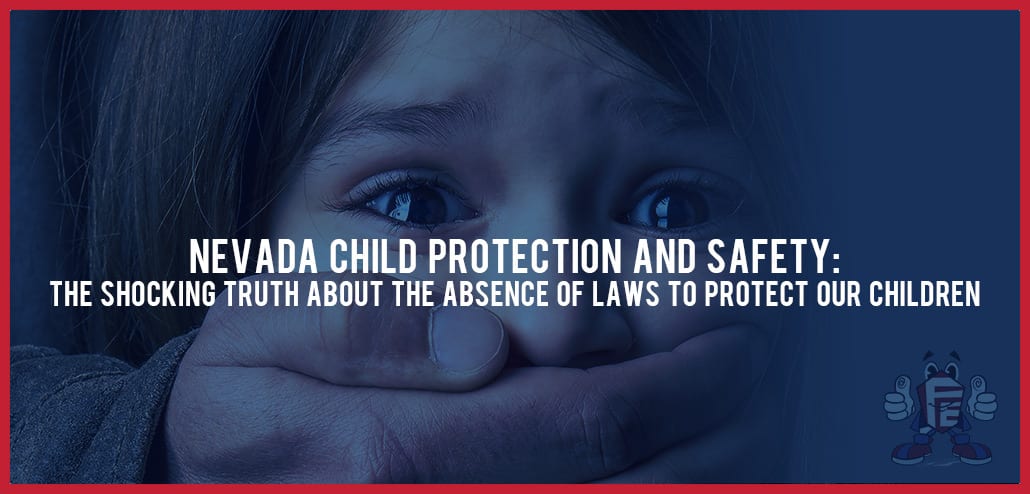All abuse is intolerable, and it is especially heartbreaking when a child is victimized. Too often we see news stories of abuse, neglect, molestation, sexual abuse, sex trafficking, and sexual exploitation of kids by adults who were entrusted with their care. This has been happening both on the local and national levels, as amplified by high-profile cases like the U. S. Youth Soccer Association lawsuit. In this and many other instances, abuse could have been prevented had these organizations implemented common-sense screening procedures, including fingerprint background checks.
Surely states have guidelines in place along these lines to protect children, right? Not always. Recently we were shocked to learn that Nevada does not have laws in place to protect children from predators, and while some organizations perform background checks for grants or liability purposes, others do not. This is especially problematic in southern Nevada.
The Nevadans for Background Checks bill passed in 2017 and touted to cover these areas to protect Nevada’s children from reoffending predators. We were shocked to find in 2018 this law specifically struck out use of the Sex Offender Registry for these background checks and the SOR database is not used to run background checks for volunteers around children. To me, this seems to void the whole point of the bill. I stood with these people at the Las Courthouse while asking Former Nevada Governor Sandoval and AG Adam Laxalt to implement this law passed. Had I known then what I know now, I would not have been on those steps supporting this bill that had all of the potential to protect our kids and failed. Now I understand why our former governmental officials could not support implementing this bill.
Even many large charities geared towards serving children do not properly vet employees and volunteers. In fact, one volunteer for a girls’ basketball coach we spoke with said that he only had to sign a piece of paper stating that he was not a criminal in order to coach six to eight-year-old girls! A former Safekey afterschool employee, in Nevada, confirmed she was never fingerprinted and was allowed to oversee a few dozen middle school children.
This should be jarring to parents and caregivers whose children spend large amounts of time with adults working for various kid-centered organizations, be it sports, camps, or other programs.
Federal Laws to Protect Children
On July 27, 2006, the Adam Walsh Child Protection and Safety Act was signed into federal law. The law was named for Adam Walsh, a 6-year old boy who was abducted from a Hollywood, Florida, mall and murdered in 1981. This federal statute did a couple of important things. First, it required that sex offenders be organized into three tiers based on the type of crime committed. Based on the tier, each offender is required to update their whereabouts regularly (tier three updates every three months, tier two every six months, tier one every year). Next, the Adam Walsh Act formed a national sex offender registry. Each state was instructed to post offender data to the internet with the following criteria: offender name and address, birthdate, photograph, place of employment, etc.
On October 1st, 2018, Nevada implemented its version of the Adam Walsh Act, restructuring the way it classifies its 7,200 plus sex offenders to be in line with federal classifications.
While opponents argue that the law is too strict and are upset that offenders will now have their personal information, including photos, available on the internet, proponents argue that it is warranted to inform the public and help prevent future crimes from happening. According to a study reported by the Bureau of Justice Statistics, released sex offenders were four times more likely to be rearrested for another sex crime when compared to non-sex offenders. Additional findings from the Office of Justice Programs found that observed recidivism rates among sex offenders, while believed to be underestimated, stood at about 5% after three years and a staggering 24% after fifteen years.
Many Nevada residents see this as a step in the right direction to help the public become aware of potential dangers but feel that organizations should perform due diligence by checking the criminal history of all those seeking employment or volunteering opportunities.
Why Background Checks Should Be Required
The importance of having organizations background check employees and volunteers cannot be overstated, especially when they are serving our state’s most vulnerable residents, including children, the elderly, and the disabled. Without checking an individual’s criminal history, you risk exposing those you serve to predators.
Name-based background checks are used by some organizations, but these can be inaccurate or incomplete based on whether or not the applicant is being truthful when providing personal information. These checks can also pull up false results from someone else that has the same name as the individual been screened.
The single best way to screen employees and volunteers is through fingerprint-based background checks, which can access information from the FBI’s Next Generation Information System. The NGI provides the most comprehensive, accurate criminal history results from all across the U.S.
Our children come into contact with a number of adults throughout the course of the day—caregivers, educators, coaches, tutors, mentors, club leaders, and more. In many cases, parents are lulled into a false sense of security knowing that teachers are background checked, never realizing that other adults that they are exposed to may not have been properly vetted.
As a diligent caregiver, there are some questions you should ask of any organization before signing your child up for a program.
- Ask what type of background check process is in place for employees and volunteers.
- If there is no background check required, ask if team members are cross-checked with Nevada’s sex offender registry as well as sex offender registries for any other states in which the worker or volunteer has resided.
- Inquire about mandatory training courses for workers as well as the policies that are in place for reporting inappropriate or suspicious behavior by those in contact with children.
- Ask if employees or volunteers are ever allowed to be alone with a child.
Based on the answers to these basic questions, you can determine whether they can provide a safe environment for your child. It is also helpful to come in and observe the program you are interested in ahead of time to see how staff and volunteers interact with the children under their supervision. If you get bad vibes during your observation, it’s best to trust your gut and look for alternatives.
Fingerprinting Express Advocates for Child Protection and Safety in Nevada
Children who are abused at the hands of an adult are left with lasting emotional scars that can stick with them for the rest of their lives. According to the 2018 Nevada Children’s Report Card from the Children’s Advocacy Alliance (CAA), Nevada received a safety grade of C-, ranking it as 17th in the nation. With better laws in place, we can see those grades improve.
As responsible members of society, we shouldn’t wait for something bad to happen to one of these precious children before taking action for better protection. Furthermore, many organizations that make such a positive impact in our communities and with our children would be permanently tarnished if one of their own was found to have abused a child.
Monica Pappas, owner of Fingerprinting Express, is working diligently with the Children’s Advocacy Alliance (CAA) and others to draft and amend laws to better protect children in Nevada to improve Nevada child protection and safety. This draft will be presented this year at the 80th Nevada legislative session. If you are a concerned parent or citizen who would like to get involved, we encourage you to reach out to your local lawmakers and ask them to help put stronger measures in place to prevent child abuse.
If you are an employer or non-profit organization interested in fingerprint background checks for your staff and volunteers, we can help make the process easy for you! With our employer accounts, we provide secure, timely criminal history background checks for new hires in any of our four clean, comfortable locations. Our Culture To Care™ discounts will make the process affordable. Get in touch with us today to learn more!
Fingerprinting Express provides assistance to organizations by offering the most accurate fingerprint criminal background checks in Nevada available using Livescan technology. We are dedicated to protecting Nevada’s children, call to find out how we can help your organization protect the children you serve.
Other Articles to Read:
Sexual Abuse Cases Involving Children on Rise: Can Background Checks Help?
School Background Check Policy Has Some Parents Angry & Others Relieved






















